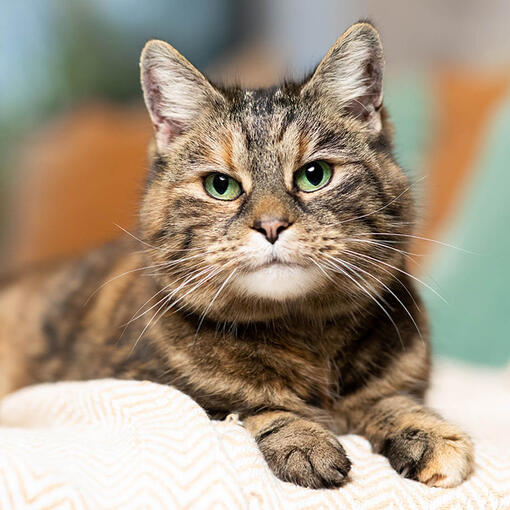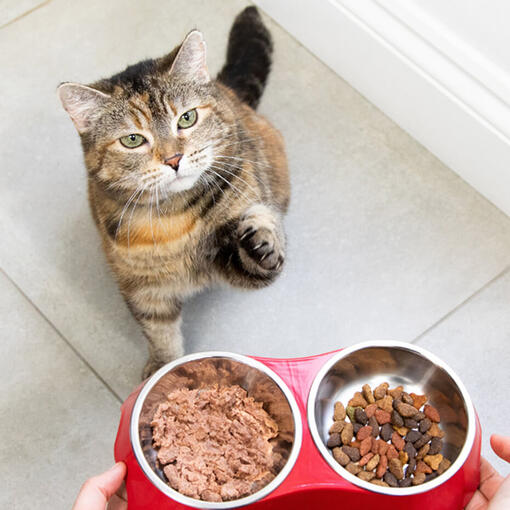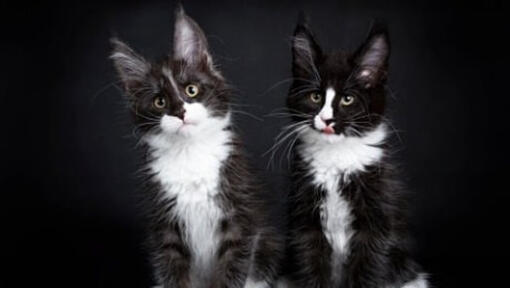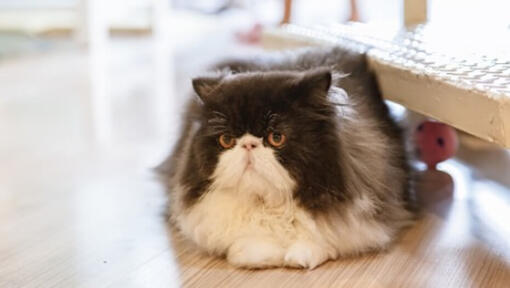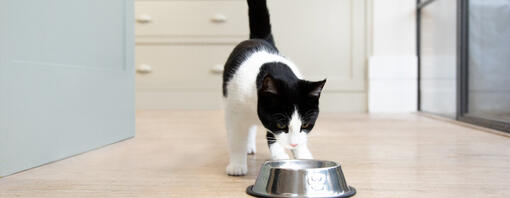
Black and white cats are incredibly popular throughout the Country, but are there any specific breeds that come in this wonderful hue? Keep reading to find out more.
Black and white cats have adorned our TV screens and book pages for years, from the Looney Toons Sylvester, Pinocchio's Figaro to our very own Felix. These monochrome kitties seem to have a personality all of their own and are well known for being mischievous. Some people even believe that they're more vocal and friendly than cats of other colours!
It's no secret that cats with this colour combination are loved around the world, but did you know that there's actually no such thing as a purely black and white cat breed? Currently, there are no cat breeds that are exclusively black and white - instead it's just a colour variation that's available in some breeds.
Types of black and white cats
The colour patterns on black and white cat breeds are actually known by different names, the most common pattern variations are as follows:
- Locket: mostly black with just a small bit of white, usually located on the stomach or neck.
- Mitted: black all over with only white feet which look like mittens.
- Tuxedo: black body with white feet, chest, stomach and nose which makes the cat appear like they're wearing a tuxedo.
- Bicoloured: half black and half white colouring.
- Magpie: white cats with random black spotting.
- Harlequin: similar to the magpie with random black spotting, but with a black tail as well.
- Cap and saddle: coloured head with a saddle patch on the cat's back, these felines might also have a black tail.
- Van: Splashes of black colouring between the ears with a black tail.
Black and white cat breeds
1. British Shorthair
The British Shorthair is an incredibly popular cat in England and where they're most commonly blue, but the breed can produce black and white cats too! Originally bred to keep rodents at bay in homes and on farms, Shorthair breeds have a thick, dense coat that was designed to keep them warm when living outside. They have kind, easy going personalities and get along famously with dogs and even children, therefore they're best suited to family life where they can get plenty of attention.
2. Cymrics
Cymrics are often thought to be a long-haired version of the Manx cat and much like them, they can be completely tailless. If this black and white cat breed has no tail whatsoever, the cats are referred to as 'rumpies', whereas if they have just a stump of a tail they are called 'stumpies'. The lack of tail is the result of a genetic mutation, which just happened to become a staple of the breed because of the remote location of the Isle of Man where they were bred. These black and white cats make kind and loving housemates but are very people orientated, so they're best suited to individuals that don't spend too much time out of the home.
Did you know? There's a legend surrounding the Manx/Cymric cat tails. The story goes that they were napping when Noah summoned the animals to the ark, then just as the door was closing, they woke up and bolted to the door! The cat just made it, but their tail got snipped off in the door in the process.
3. Maine Coon
These large kitties are available in over 30 colour variations - including black and white - and are actually one of the largest domestic cat breeds. They're heavily boned and long bodied with big fluffy coats which only adds to their large size.
With adaptable and friendly personalities, Maine Coons are known for loving all members of the family, including dogs and children. Some owners of the breed have even mentioned that they have a dog-like personality and will even take their kitty for walks on leads.
4. Munchkin
The Munchkin is known as the Dachshund of the cat world because they share a similar genetic mutation with their short legs. Their coats can be just about any colour or pattern, so they can be black and white cats as well. Lovers of the breed know that they have very cheeky personalities and according to Catster, some refer to them as magpies as they're known to pinch their owner's possessions and store them away.
Don't let their little stubby legs fool you though, they're actually incredibly high energy and are always down for playing, whether that's with you, your kids or even your dog!
5. Japanese Bobtail
Thought of in their homeland of Japan as the original lucky cat, the Japanese Bobtail is believed to bring good luck to anyone who shares their home. Most commonly found in a mixture of black, red and white (thought to be a lucky colouring), they can also be a black and white cat breed. With their irresistibly cute pom-pom like tail and long hind legs, the Japanese Bobtail has an unusual appearance that's been captured in Japanese art for at least 1000 years.
Did you know? The Japanese Bobtail is quite a vocal cat and is known to have a sing-song meow!
6. Siberian Forest Cat
The Siberian Forest cat is a beautifully fluffy breed with large paws and super-soft fur. The earliest reference of this black and white cat goes back as far as 1000AD, so it may come as a surprise to learn that they were only brought to the UK in 2002. Due to their large size and love for nature, they're best suited to homes where it's safe for them to venture outside to explore, so they don't tend to do well in cities or apartments.
7. Persian
Perhaps the most royal of all cat breeds, the Persian comes in a variety of colours and can even be a black and white cat. First brought to Europe in 1626 and favoured by Queen Victoria in the 19th century.
These fancy felines like to be treated with respect and gentleness and can become an incredibly loving lap cat. Now, the Persian is one of the most loved cat breeds in the entire world, which is no surprise with their calm demeanours, soft coats and adorably round cheeks. Because of their sensitive natures, they don't tend to do well in households with young children or other pets, and instead prefer the limelight to be focused on them at all times.
That's our list of top 7 black and white cat breeds. Want to find out more about your feline's behaviour? Read our article on why cats have whiskers.

